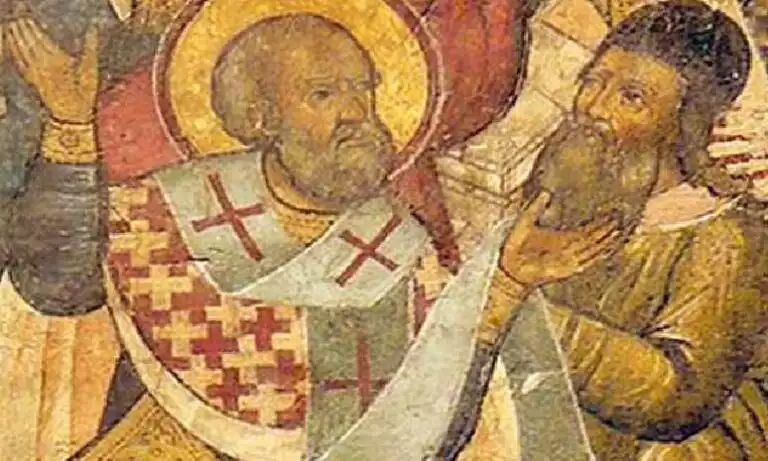
Arius (c. 256–336 AD), a presbyter of Alexandria, remains a figure of significant theological controversy. Known primarily for his role in the Arian controversy, his teachings challenged the mainstream understanding of the Trinity, sparking a pivotal debate in early Christianity. His doctrine, which posited that the Son of God was not eternal and therefore not of the same essence as God the Father, led to the first ecumenical council at Nicaea in 325 AD.
Early Life and Ordination
Arius was born around 256 AD in Libya. His early life, shrouded in obscurity, offers little in terms of detailed biography. However, it is known that he moved to Alexandria, where he was influenced by Lucian of Antioch’s teachings. Ordained as a presbyter under Bishop Achillas of Alexandria, Arius was recognized for his ascetic lifestyle and eloquent preaching. His charisma attracted a significant following, laying the groundwork for his later theological assertions.
Arius’ theological journey was marked by his staunch opposition to the prevailing teachings of his time. He was particularly critical of the popular Christological understandings, which he perceived as blurring the distinct natures of the Father and the Son. This stance would later crystallize into the core of his teachings, leading to significant ecclesiastical conflict.
Development of Arianism
Arius’ theological views developed into what would be known as Arianism. Central to his doctrine was the belief that the Son of God, though divine, was not co-eternal with the Father. Arius argued that the Son was created by the Father and therefore had a beginning. This concept directly contradicted the widely held belief in the co-eternity and consubstantiality of the Trinity, sparking widespread debate and controversy.
The spread of Arianism was facilitated by Arius’ persuasive oratory and the dissemination of his letters and hymns, which articulated his views in a form accessible to the layperson. His teachings gained considerable traction, particularly among certain bishops and lay Christians. This burgeoning support for Arianism alarmed the ecclesiastical hierarchy, leading to its condemnation in local synods.
Arius’ ideas, while gaining a following, also attracted vehement opposition, most notably from Alexander of Alexandria, his bishop. The theological dispute between Arius and Alexander was not merely a local controversy; it rapidly escalated into a broader ecclesiastical crisis, necessitating the intervention of the Roman Emperor Constantine. This dispute set the stage for the Council of Nicaea, a landmark event in the history of Christianity that would address the doctrinal challenges posed by Arianism.
The significance of Arius in early Christian history cannot be overstated. His teachings, though controversial, played a pivotal role in shaping the theological discourse of his time, leading to doctrinal clarifications that would profoundly influence the development of Christian orthodoxy.
The Council of Nicaea and Its Aftermath
The Council of Nicaea, convened by Emperor Constantine in 325 AD, marked a critical juncture in the Arian controversy. Arius’ teachings were central to the council’s agenda. The council, attended by bishops from across the empire, aimed to achieve ecclesiastical unity and address the theological divisions caused by Arianism. The resultant Nicene Creed, a foundational statement of Christian belief, explicitly countered Arian views, affirming the co-eternity and consubstantiality of the Son with the Father. Arius and his teachings were condemned, and he was exiled.
Despite this condemnation, the Arian controversy did not end with the council. Arianism continued to find support, particularly in the Eastern parts of the Empire. The succeeding decades saw a fluctuation in the fortunes of Arianism, with various emperors and bishops showing alternating support and opposition. Arius himself, though exiled, continued to be a figure of influence and contention until his death.
Legacy and Historical Significance
Arius’ legacy is marked by the enduring impact of the Arian controversy on Christian theology and ecclesiastical politics. The debate over his teachings significantly shaped the development of early Christian doctrine, particularly regarding the nature of Christ and the Trinity. The controversy also illustrated the emerging role of imperial authority in church matters, setting a precedent for future interactions between the state and the church.
Historically, Arius is seen as a pivotal figure in the theological and political landscape of early Christianity. His role in prompting the first ecumenical council underscores his significance in the history of the Christian church. While his teachings were ultimately deemed heretical, their influence persisted, contributing to the ongoing development of Christian theology and ecclesiastical structures.
Arius, the Presbyter of Alexandria, remains a central figure in the history of Christianity. His teachings, which challenged prevailing orthodox beliefs, instigated one of the most significant theological debates in the early Church. The legacy of the Arian controversy, culminating in the Council of Nicaea, continues to be felt in the theological and ecclesiastical realms. Arius’ role in this pivotal moment in Christian history underscores the profound impact of theological discourse on the evolution of religious beliefs and practices.
References
- Barnes, Timothy D. “Constantine and Eusebius.” Harvard University Press, 1981.
- Williams, Rowan. “Arius: Heresy and Tradition.” Eerdmans, 2002.
- Gallica (accessed 19 December 2023).
- Theses.fr (accessed 19 December 2023).
- Oxford Academic – Book 10915 (accessed 19 December 2023).
